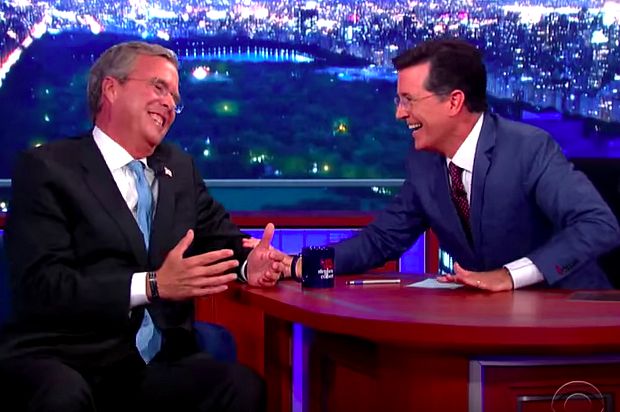Early on in his first night helming “The Late Show,” Stephen Colbert engaged, in an oblique way, a question a lot of us have been mulling. “With this show,” he said, “I begin to search for the real Stephen Colbert. I just hope I don’t find him on Ashley Madison.”
Even after numerous magazine and newspaper pieces, viewers came into Tuesday night not entirely clear what to expect from Colbert. He’s not the ironic, apolitical Midwestern grouch David Letterman played. He’s no longer the heartless reactionary blowhard he’s impersonated for years. (“I used to play a narcissistic conservative pundit,” he said while speaking to Jeb Bush. “Now I’m just a narcissist.”) No one expected that he’d turn out to be a slightly older version of Jimmy Fallon’s hanging-out-with-my-friends routine; whatever Colbert is made of, it’s not boyish naivete.
What we saw Tuesday night was someone who loves being onstage. (This is not a requirement for hosting a show; Letterman often projected deep discomfort with the whole thing.) He loves music in an emotional and physical way; he can barely keep himself from moving when band leader Jon Batiste plays.
And more than anything, we saw someone who enjoys talking about politics – not just satirizing political discourse in an arch way. Colbert grew up in South Carolina; he was raised Catholic and still remains devout. He introduced his conservative brother during the show. As someone who comes across as more or less culturally and politically centrist – Colbert’s persona is largely free of Stewart’s urban/ hipster/ lefty affect — he can connect with a wider range of guests than either Stewart or Letterman. And unlike Stewart, he doesn’t seem to engage with political issues in the same kind of moral way, at least not yet. (Think of how differently Stewart would have delivered Colbert’s line about civil rights winning the pennant and racism winning the World Series.)
In fact, the best parts of Tuesday’s broadcast happened when Colbert returned to politics. His Donald Trump/Oreos metaphor was probably the the best bit of the whole night. (I say this as someone who mostly disagrees with his point here – I think the media needs to pay sufficient attention to Trump. But the sequence was artfully and intelligently done.) And his interview with GOP presidential candidate Jeb Bush was far more interesting, even, than his conversation with George Clooney — no small feat, considering the fact that Clooney, even when coasting, is significantly wittier and more fun than Bush.
With Bush, Colbert showed once again what a very skilled interviewer he is — empathetic enough to draw out his subject but tough and alert enough not to let him fall back on evasive answers. He brought out both Bush’s purported strengths – his sense of reasonable-ness – and his enduring weakness: His failures of tone and timing made clear why he’s not electrified voters. (Colbert, by contrast, is extremely sensitive to the audience, not just soaking up their applause, but noting when it didn’t come. “Oh, you were so close to getting them to clap!” he told Bush, before explaining how it works.)
Colbert should continue to bring in politicians across the spectrum. And there’s no reason for him to remain entirely apolitical: He excels at bits like the Trump sequence as well. That one is hard to imagine Fallon or Jimmy Kimmel executing quite as well.
Do these qualities make up “the real” Stephen Colbert? Who knows. For those of us outside his friends and family, the important question is who we’ll see on television every night.
So the opening show was widely judged to be consistently funny and promising. Colbert was friendly, fun, assured, and in some ways noncommittal. “This show may not completely know what it is yet, but it knows exactly who its host is: a smart, curious, playful entertainer who’s delighted to be there,” James Poniewozik wrote in the New York Times. “Mr. Colbert was one character for a decade; now, he could be several people any given night.” For now, that’s about as close as we’ll get to who Colbert really is
If Colbert remains flexible, limits the empty movie-star interviews, and keeps a focus on politics in a very different way than the obnoxious, fictitious “Stephen Colbert” did, he can bring us something very rare: a television show that can consistently surprise us.


